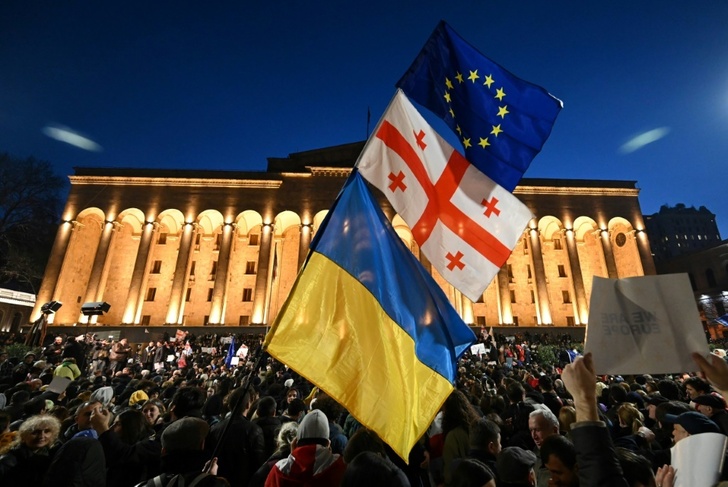In a verdant university courtyard in the Georgian capital, a gaggle of students discuss plans to attend a protest at the Tbilisi Airport against the resumption of air links with Russia.
"When I see my country sliding into a Russian orbit, all I feel is bitterness and anger," said Lasha Sigua, a 20-year-old history student.
On Friday, a Russian airline will operate a direct flight from Moscow to Tbilisi, the first in four years, and opposition parties have vowed to stage protests at the airport.
"We will be there. We can't watch indifferently that for Georgia it is business as usual with Russia, which is waging an atrocious war against Ukraine," said Sigua.
Georgia and its former Soviet master Russia share a complicated history.
In 2008, after years of tensions over the small South Caucasus country's efforts to forge closer ties with the West, Moscow fought a brief but bloody war with Georgia. After the war, Moscow recognised two separatist territories in the north of the country as independent, stationing military bases there.
In response to anti-Moscow rallies in Tbilisi, Russia banned air travel with the country in 2019.
But in a surprise move last week, Russian President Vladimir Putin lifted a flight ban with Georgia.
He has also introduced a 90-day visa-free regime for Georgian citizens.
Putin's decision has sparked mixed feelings in the Black Sea nation whose government faces mounting accusations of covertly cooperating with the Kremlin after years of tensions.
Hundreds of Georgians already took to the streets to protest against the resumption of flights this week.
"The whole civilised world is isolating Putin, but the Georgian government is happy to reopen air links with Putin's Russia," said Sigua's friend, Kote Ratiani.
"This is unacceptable, and we will be protesting against it," added the 19-year-old biology student.
- 'Hybrid war' -
Elene Khoshtaria, leader of Droa, an opposition party which has called for the demonstration, said protesters would use physical force if need be.
"We will not let them operate in Georgia," she told AFP of the flights.
She accused the ruling Georgian Dream party of committing "treason," adding that it would "receive an appropriate reaction from Georgian citizens."
Georgia's pro-EU President Salome Zurabishvili was quick to slam Moscow's decision to resume air travel, calling it "another Russian provocation."
The resumption of air travel comes as Moscow's offensive in Ukraine stretches into its second year and Russia's isolation from the West deepens.
Analyst Gela Vasadze called Putin's move "part of a hybrid war aimed at spoiling Georgia's relationship with the West."
But Prime Minister Irakli Garibashvili has welcomed the return of flights as Putin's "very positive decision from a humanitarian point of view."
He said only Russian airlines and aircraft that are not affected by Western sanctions would be allowed to operate in Georgia.
"I want to reassure our friends in the European Union and elsewhere: this is only about economic and trade relationships," he said.
He also said that last year Russia collected around $300 billion from trade with the EU.
- 'Strategic patience' -
Critics have accused Garibashvili's government of failing to secure candidacy for EU membership and flirting with the Kremlin.
Georgia applied for EU membership together with Ukraine and Moldova after Russia invaded its pro-Western neighbour in February 2022.
Last June, EU leaders granted formal candidate status to Kyiv and Chisinau, but urged Tbilisi to reform the justice and electoral systems, improve press freedom and curtail the power of oligarchs.
"Since the beginning of the war in Ukraine, Georgian government's behaviour has been schizophrenic," said political analyst Ghia Nodia.
"They say they want European integration and at the same time their posture towards Europe is confrontational.
"Georgian Dream leaders' rhetoric towards the West is hostile, but they never criticise Russia. They are practically sabotaging Georgia's EU integration," he added.
Garibashvili has dismissed such claims, calling them "an insult to the Georgian people."
Speaking last week, he said that his government's stance on Russia was shaped by "strategic patience and pragmatic policy."
The ruling party insists it is committed to Georgia's EU and NATO membership bids, enshrined in the constitution and supported according to opinion polls by 85 percent of the population.
"The EU wants a democratic Georgia and in democracies one can be voted out of power," said analyst Nodia.
"That's why the ruling party, which only cares about staying in power, sees the West as its natural enemy, and the Russian autocrat as a comfortable partner."
im/as/giv/mca
© Agence France-Presse
Your content is great. However, if any of the content contained herein violates any rights of yours, including those of copyright, please contact us immediately by e-mail at media[@]kissrpr.com.
Source: Story.KISSPR.com

